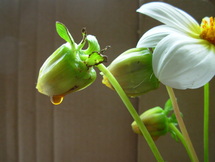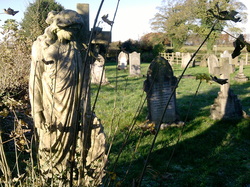 even my dahlias are weeping
even my dahlias are weeping My first post last month was a review of a novel about a family trying to come to terms with the death of a child. Its author, Carys Bray, told me that her own experience of losing a child, albeit in different circumstances, had contributed to her interest in grief and its effects on people. Unresolved grief was the trigger for Janet Watson’s memoir of her adolescence, Nothing Ever Happens in Wentworth. Yet, for many of us, the relationship between grief and loss in our own lives and on the page is less transparent.
 as is the angel
as is the angel Yet I wouldn’t go so far as to say that unhappiness in literature is inherently superior to happiness. Anna Elliott has written a convincing defence of happy – or, at least, not sad – in relation to endings and Emma Darwin counsels novice writers against jumping on the bandwagon (although she’d never stoop to such a cliché) of grief and death on the assumption it will give their work gravitas. This is one way where the diktat of write what (at least, the emotions) you know should hold sway, and fiction as an excuse for an outpouring of unprocessed emotion or a writer dictating what the reader must feel has a good chance of provoking the opposite reaction in me.
On the other hand, some familiarity with grief might give our writing greater depth. For some, it’s also served as the trigger to make space our lives for writing: there’s nothing like a loss to help us clarify what matters. Monica Ali began her debut novel, Brick Lane, straight after her grandfather’s funeral. Harriet Lane has said that she became a novelist only because she had to give up her career as a journalist after developing problems with her sight.
Some would take that a stage further, arguing that grief is the very foundation of a writer’s art. Posting back in January on Writer Unboxed, Therese Walsh suggested that:
Most artists are fundamentally inconsolable. That’s why they keep doing it.
That one word, inconsolable (borrowed from the actor Emma Thompson), speaks volumes, pointing to a loss that is more character-trait than life-event, something we live with rather than recover from. It reminds me of a quote from my favourite collection of psychoanalytic case studies that emphasises the enduring sense of grief:
My experience is that closure is an extraordinarily compelling fantasy of mourning. It is the fiction that we can love, lose, suffer and then do something to permanently end our sorrow. We want to believe we can reach closure because grief can surprise and disorder us – even years after our loss. (Stephen Grosz, The Examined Life, p209)
| | The human need for consolation has inspired some of the finest classical music. You can’t get much better than the In Paradisum from Faure’s Requiem, from which I drew inspiration for a musical flash, or Verdi’s terror-inducing Dies Irae. Yet sometimes the profane can be more powerful, as in this well-known ditty from Monty Python. |





















 RSS Feed
RSS Feed





















